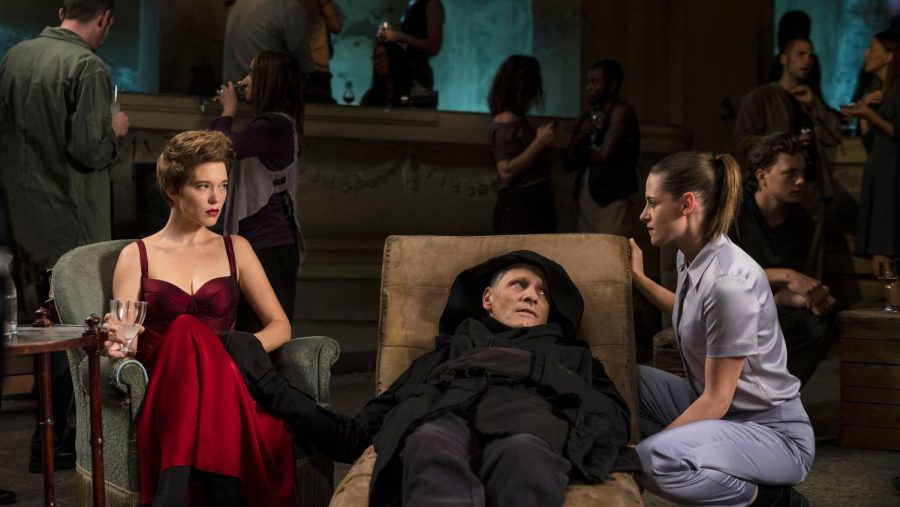Crimes of the Future Review
June 9, 2022
If you’re going into David Cronenberg’s latest film expecting a return to form for “the master of body horror” you will probably find yourself disappointed. By no means is Crimes of the Future middling, in fact it’s the best film of 2022 so far but Neon’s misleading marketing focuses solely on the film’s most gruesome “Cronenbergian” moments and strangely misses the focus of the actual plot: art.
In an unspecified dystopian future, humanity is rapidly evolving and the ability to feel pain has disappeared. Out of this confusion, Saul Tenser and his lover, Caprice, have emerged as the closest thing this world has to celebrities: performance artists that experiment with and display their organs. Of course Saul is a classically tortured artist with Viggo Mortensen wonderfully animating his character’s ever shifting physical discomfort through his scratchy voice and sad longing eyes. The tortuous labor of birthing art manifests quite literally within his body. When Caprice awakes her lover over the new organ he has grown overnight, he states “I was feeling creative.” The changes occurring in Saul’s body are matched by the decaying world that surrounds him as lesser artists make his craft obsolete and the government starts to police rising movements.
Despite the film’s seeming dystopia, Cronenberg never paints this future as a solely bleak one. The world has been ravaged by human waste but the species has found ways to persevere through artistic creation. Unlike Cronenberg’s previous films, the alteration of the body is not portrayed as grotesque horror but rather as a natural process . His relationship with Caprice grows stronger throughout the film as she comes into her own as an artist alongside him. The pair does not consummate their passion through traditional sex, but their surgery yields alternative methods of connection. The world is dying yet love persists.
Another element that might surprise audiences expecting shocking provocation is the fact that Crimes of the Future is hysterical. Cronenberg’s films have always possessed more humor than they are given credit for but Crimes features the most overt comedy in the director’s career. The cast mines the (purposefully) stilted dialogue for some deliciously bizarre line readings. Cronenberg has empathy for the body art in this world but he doesn’t miss the opportunity to rib the reverence its denizens have for it.
The best gag in the whole film is a pair of government officials who awkwardly fawn over Saul and how his abilities are “potent with meaning” as Kristen Stewart’s character Timlin puts it. Speaking of Stewart, I would be remiss if I didn’t mention that she gives possibly the best performance of her career in this. Some will say Stewart is too “over-the top” but this ignorant dismissal fails to understand how skilled the actress is at being “over-the-top.” She plays her character almost like a parody of the shy persona she created in her earlier work to great comic effect. She is perfectly tuned to the film’s sense of humor and gets the most laughs out of any character.
Among its many delightful surprises, Crimes of the Future is a strangely beautiful coda to Cronenberg’s filmography. Throughout his career Cronenberg has explored the system of the body not as mere flesh but as an extension of the mind and its fears, desires and pain. In his films, these systems both physical and psychological come to a head in the climax. From James Wood’s TV ordered suicide in Videodrome to the inevitable mutual destruction of the Mantle twins in Dead Ringers, the clashes of body and psyche result in the annihilation of the individual.
Without spoiling the ending, Crimes of the Future shows a man accepting himself and with the body and mind finally in harmony he transcends base humanity to become something more luminous.






